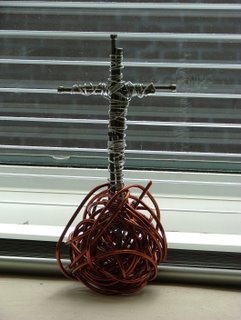Yesterday I went back to school, as a parent helper on my daughter's class trip to a local farm. Once I start my new job, I'm seriously considering volunteering in school on a regular basis, and this was a great opportunity to try it out. Another mum from church came too. I thought it might be a chance to get to know Susannah's teachers (she has one on Mon-Wed, and another Thurs-Fri; both were due to be on the trip). But as it turned out, both were off sick. (If they weren't such good teachers, I'd be suspicious - after all, it was an outdoor activity on a rainy day!) And so, at short notice, it became an opportunity to get to know the head teacher - who was standing-in - a little.
Despite the rain, we all survived!
Later on, I was reflecting on the trip. When we entered the building that housed the pigs, and again when we entered the building that housed the poultry, we had to walk through a mat soaked in disinfectant. It is a simple and matter-of-fact precaution; and, with it in place, it is fine to walk all around the farm without fear of contamination, or contaminating. It made me think about Jesus washing his disciples' feet [
John 13:1-17]. At first, Simon won't let him; then, when Jesus tells him, "Unless I wash you, you have no part with me." he wants Jesus to wash "...not just my feet but my hands and my head as well!" But Jesus answered, "a person who has had a bath needs only to wash his feet; his whole body is clean. And you are clean..."
So often, it seems to me, Christians worry about being contaminated by the world - and even more so about their children being contaminated by the world. Jesus seems very matter-of-fact about dealing with such potential contamination; but he seems clear that our feet getting dirty is not a
fundamental problem - not one that needs to be avoided, let alone avoided at all costs.
We get bombarded with all kinds of stuff - a lot of sexual images; material (money; power) images - just like the first Christians were bombarded with images - sexual images; images of the Ceasar-as-god and (therefore) patron/provider...Like Jesus in the desert, we are bombarded with suggestions, tempting us to take our own gratification into our own hands. And these things are
not a
fundamental problem; just - desert - dust on our feet.
We often come across the feet-washing image in churches; sometimes we even actually wash each other's feet, as a physical symbol of a spiritual cleansing. The focus tends to be on getting ourselves clean; being made right, again, with God and with each other; restoring relationships with one another as we serve each other. But it seems to me that this misses the main thrust of Jesus' point, which is that we have already been made clean, in a fundamental sense.
I realise that I am a work-of-God-in-progress; that there is a being-done and a not-yet-done dimension to redemption and sanctification; that I will not be made fully whole in this life. But, in a fundamental sense, I have been redeemed; I have been washed clean.
I guess the real issue is whether we believe that we are
fundamentally fallen - broken, damaged - people, who happen to have been redeemed: in which case, we need to fear contamination, because we will be drawn to our most fundamental nature...or whether we believe that we are
fundamentally redeemed - that yes, we are fallen/broken/damaged; but that our having been redeemed
goes deeper than these things: in which case, we just need to deal with the dust.
I believe that at the
most fundamental level I am
redeemed; restored into relationship with God and his creation. That is what the Father created me for; that is what the Son lay down his life to acheive; and that is the condition the Holy Spirit keeps me in, as well as guaranteeing the being-done and not-yet-done dimensions.
What might this mean for our practices as church? Perhaps we need to develop a new symbol, or de/re-construct the ancient one, that acknowledges matter-of-fact-ly that our feet get covered in dust as we walk through the world...but that celebrates the fact that we have already been made clean; celebrates the fact that we have already been brought-into relationship with each other. Because I don't wear open sandals, I'm not sure I need my bare feet washed; maybe we might brush clean each other's shoes? The shoe-shine is an image - and a subservient one - of a now-passed age. Perhaps someone ought to resurrect it?








































